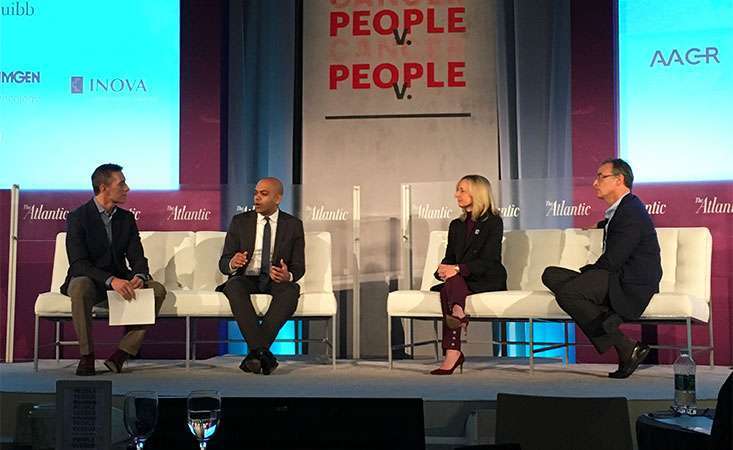
Julie Fleshman, JD, MBA, participated in a prestigious precision medicine panel at People v. Cancer.
The Atlantic’s People v. Cancer event took place Nov. 14, 2018, in New York City. The event featured a stellar lineup of researchers, doctors, reporters and leaders in the for-profit and nonprofit biomedical industries, including Julie Fleshman, JD, MBA, president and CEO of the Pancreatic Cancer Action Network (PanCAN).
“I’m honored to be invited to speak at this event, alongside luminaries like Katie Couric and Dr. Liz Jaffee, current president of the American Association for Cancer Research,” Fleshman said. “The focus of People v. Cancer is on harnessing ‘the power of human stories to spotlight the latest advances in cancer research, treatment and care’ – which is of particular importance for a disease like pancreatic cancer.”
The third leading cause of cancer-related death in the United States, pancreatic cancer has the lowest five-year survival rate of any major cancer at just 9 percent.
Fleshman added, “The timing of this gathering is incredible, too, occurring during Pancreatic Cancer Awareness Month and just one day before World Pancreatic Cancer Day on Nov. 15.”
Fleshman participated in a panel discussion entitled, “Personalizing Cancer Care.”
Personalized medicine, also known as precision medicine, refers to tailoring a patient’s treatment to match the biological and clinical details of their case. Through a test called molecular profiling, patients and their healthcare teams can learn about the biological characteristics of their unique tumor.
Since every pancreatic tumor is different, PanCAN strongly recommends molecular profiling of your tumor to help determine the best treatment options.
.@JulieFleshman of @PanCAN sharing the work of Know Your Tumor Foundation for pancreatic cancer patients: Third party vendors conducted tests to report recommended treatment options for cancer patients #PeopleVCancer pic.twitter.com/rgkDn95SrS
— AtlanticLIVE (@AtlanticLIVE) November 14, 2018
Fleshman’s remarks focused on Know Your Tumor®, PanCAN’s precision medicine service that has provided molecular profiling reports to more than 1,000 pancreatic cancer patients across the country.
“In the four years since we launched Know Your Tumor, we’ve found that about half of the patients who participate have at least one ‘actionable’ alteration in their tumor, which means that information gained through the report can guide treatment decisions for that patient,” Fleshman said. “We also published findings that more than a quarter of patients have a ‘highly actionable’ alteration, referring to compelling clinical evidence in at least one cancer type that a certain treatment is particularly beneficial for patients with that alteration in their tumors.”
She continued, “And when patients with highly actionable alterations go on a treatment that aligns with their tumor’s biology, they have better outcomes.”
One of Fleshman’s co-panelists, Nikhil Wagle, MD, medical oncologist at Dana-Farber Cancer Institute, asserted the importance of learning from every patient – including those who do not receive treatment at major cancer centers.
Fleshman noted that nearly a third of patients who participate in Know Your Tumor are referred from community physicians – and that the service is mostly patient-driven.
Looking forward, panelist Vincent Miller, MD, chief medical officer at Foundation Medicine, said that the field of precision medicine is still young. He noted that sometimes, patients with certain molecular features in their tumors respond well to a particular therapy unexpectedly – and that the mechanism of action of the drug can be discovered through this information.
Events like People v. Cancer provide a critical opportunity to bring together key stakeholders across clinical, scientific, policy and advocacy disciplines. Other topics covered included survivorship, immunotherapy, translating lab findings to clinical impact and more.
“Being surrounded by so many cancer experts brings me so much hope,” Fleshman said. “And it’s great to see pancreatic cancer spotlighted on such an important stage.”
She added, “The goal of Pancreatic Cancer Awareness Month is to bring awareness to the disease – and participating in People v. Cancer was an excellent opportunity to do just that.”














